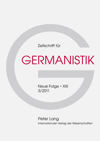
ZEITSCHRIFT FUR GERMANISTIK
metrics 2024
Exploring the Depths of German Language and Culture
Introduction
ZEITSCHRIFT FUR GERMANISTIK, published by PETER LANG GMBH, is a distinguished academic journal that serves as a vital resource in the fields of German studies, literature, linguistics, and cultural analysis. With an ISSN of 0323-7982, this journal provides critical insights and promotes scholarly discourse surrounding the evolving landscapes of German language and literature. Although it operates under a traditional access model, readers and researchers benefit from its rigorous peer-reviewed articles that span decades of intellectual inquiry. Historically featured in Scopus, the journal is noted for its impactful contributions, ranking 244th in Literature and Literary Theory and 406th in Linguistics and Language, highlighting its importance in the academic community. Situated in Bern, Switzerland, ZEITSCHRIFT FUR GERMANISTIK not only caters to scholars seeking to enrich their understanding of Germanic studies but also aims to bridge gaps across interdisciplinary borders, fostering a deeper appreciation of the cultural narratives that shape our world.
Metrics 2024
 -
- -
- 0.10
0.10 -
-Metrics History
Rank 2024
Scopus
JCI (Web Of Science)
Quartile History
Similar Journals
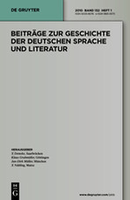
BEITRAGE ZUR GESCHICHTE DER DEUTSCHEN SPRACHE UND LITERATUR
Connecting the Past and Present of German LiteratureBEITRAGE ZUR GESCHICHTE DER DEUTSCHEN SPRACHE UND LITERATUR is a distinguished scholarly journal published by Walter de Gruyter GmbH, focusing on the historical development of the German language and literature. With an ISSN of 0005-8076 and an E-ISSN of 1865-9373, this journal has been a pivotal resource for linguistic and literary scholars since its inception in 1874. Hailing from Germany, it serves as a critical platform for understanding the nuanced evolution of Germanic studies, contributing to its categorization in the Q4 and Q3 quartiles in Linguistics and Language and Literature and Literary Theory, respectively, as of 2023. Although not open access, the journal provides invaluable peer-reviewed content that fosters scholarly dialogue and research in its specialized fields, making it an essential read for researchers, professionals, and students dedicated to the richness of German linguistic heritage and literary analysis. The journal's extensive history and commitment to academic excellence position it as a key player in the ongoing discourse within the humanities.

Studien zur Deutschen Sprache und Literatur-Alman Dili ve Edebiyati Dergisi
Exploring the richness of German language and literature.Studien zur Deutschen Sprache und Literatur-Alman Dili ve Edebiyati Dergisi is an esteemed academic journal published by ISTANBUL UNIV, FAC LETTERS, dedicated to the vibrant exploration of German language and literature, alongside critical studies in cultural contexts. Operating with an Open Access model since 2017, the journal facilitates unrestricted dissemination of knowledge, ensuring accessibility for researchers, educators, and students worldwide. Based in Turkey, this journal plays a significant role in the scholarly community, as evidenced by its rankings in Cultural Studies, Linguistics, and Literature and Literary Theory. Although it currently holds a Q4 ranking in Cultural Studies and Linguistics and a Q3 ranking in Literature for the year 2023, it offers invaluable perspectives that contribute to ongoing dialogues in these fields. The journal has established convergence from 2021 to 2024, creating a cohesive platform for the latest research and discussions in German linguistics and literary theory, and invites submissions from scholars aiming to enhance the understanding of the Germanic domain.

CONFLUENCIA-REVISTA HISPANICA DE CULTURA Y LITERATURA
Illuminating the Complexities of Hispanic NarrativesCONFLUENCIA-REVISTA HISPANICA DE CULTURA Y LITERATURA, published by Colorado State University, is a pivotal academic journal that has been contributing to the fields of Cultural Studies, Literature and Literary Theory, and Visual Arts and Performing Arts since 2002. With its ISSN 0888-6091 and E-ISSN 2328-6962, the journal aims to foster interdisciplinary dialogue and showcase innovative research that bridges literary analysis with cultural phenomena. As highlighted by its impressive rankings, the journal holds a Q3 category in Cultural Studies and Q2 in both Literature and Literary Theory and Visual Arts and Performing Arts, reflecting its significance and the quality of its contributions. Although it currently does not offer open access, the journal remains a respected platform for scholars, providing rich content that engages and inspires further research in the humanities. As it converges years from 2002 to 2024, CONFLUENCIA stands at the forefront of exploring the complexities of Hispanic culture and literature, making it an indispensable resource for researchers, professionals, and students alike.

POETICA-ZEITSCHRIFT FUR SPRACH-UND LITERATURWISSENSCHAFT
Nurturing Academic Excellence in Language and LiteraturePOETICA-ZEITSCHRIFT FUR SPRACH-UND LITERATURWISSENSCHAFT is a pivotal journal published by Brill, focusing on the fields of linguistics and literary studies. Founded in Germany, this esteemed publication showcases rigorous scholarly research, fostering a deeper understanding of language and literature. Although the journal does not currently operate as an open-access platform, it remains an essential resource for academics in these areas, featuring innovative studies that span from 2002, through selected years, to 2024. With a Q4 category in Linguistics and Language and a Q3 in Literature and Literary Theory as of 2023, POETICA ranks among the significant contributors to the arts and humanities discourse. It provides a vital forum for researchers and students to engage with contemporary debates and methodologies, ensuring its relevance and importance in the academic community.
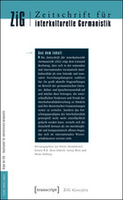
Zeitschrift fur Interkulturelle Germanistik
Examining Language as a Vehicle for Cultural UnderstandingZeitschrift für Interkulturelle Germanistik is a leading academic journal specializing in the field of intercultural studies and German linguistics. Published by TRANSCRIPT VERLAG, this journal serves as a platform for innovative research, critical essays, and interdisciplinary discussions that explore the complexities of cultural interactions within the German-speaking world and beyond. With a commitment to fostering scholarly exchange, the journal invites contributions that delve into themes such as language, identity, migration, and cultural dialogue. Although the journal does not currently offer open access, its robust editorial standards are aimed at providing readers with high-quality, peer-reviewed content. Researchers, professionals, and students engaged in German studies will find this journal an invaluable resource for the latest findings and theoretical advancements in intercultural communication and Germanistik. For more information, visit TRANSCRIPT VERLAG's official page.

COLLOQUIA GERMANICA
Empowering Academic Voices in Germanic StudiesCOLLOQUIA GERMANICA, published by FRANCKE VERLAG, serves as a vital platform for the dissemination of scholarly research in the fields of linguistics, literature, and literary theory. With a rich history spanning from 2002 to 2017 and again from 2020 to 2024, this journal is indexed under ISSN 0010-1338 and is recognized within Q4 quartile rankings in both Linguistics and Language, and Literature and Literary Theory as of 2023. Although it operates primarily on a subscription basis, this journal endeavors to enhance academic discourse and promote innovative research that contributes to our understanding of Germanic languages and literature. Researchers and professionals can greatly benefit from the journal's content, given its position in Scopus with notable rankings and percentiles in various categories. COLLOQUIA GERMANICA invites submissions that offer fresh insights into the intricacies of language and literature, making it an essential read for academics and students alike.
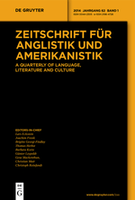
ZEITSCHRIFT FUR ANGLISTIK UND AMERIKANISTIK
Illuminating Linguistic and Literary LandscapesZEITSCHRIFT FUR ANGLISTIK UND AMERIKANISTIK is a distinguished academic journal dedicated to the fields of English studies and American studies, published by Walter de Gruyter GmbH. Nestled in Germany, the journal has carved a niche for itself since its inception, offering a vital platform for scholars interested in the nuances of linguistics, literature, and cultural studies. Although it currently operates without an open access model, its rich repository of research is invaluable for those keen to explore the historical and contemporary intersections of English and American literature. With an ongoing commitment to publishing high-quality, peer-reviewed articles, the journal has garnered attention in Scopus rankings, receiving recognition in both the Q3 and Q4 quartiles for literature and linguistic studies respectively. As a hub for innovative research, ZEITSCHRIFT FUR ANGLISTIK UND AMERIKANISTIK encourages robust dialogue and scholarly exploration, making it an essential resource for researchers, professionals, and students alike in the ever-evolving landscape of linguistic and literary theory.

REVISTA DE LITERATURA
Celebrating diverse voices in contemporary literature.REVISTA DE LITERATURA, published by the Consejo Superior de Investigaciones Científicas (CSIC) in Spain, stands as a beacon of scholarly excellence in the field of Literature and Literary Theory. With an impressive Q1 ranking in its category for 2023, the journal has established a reputable position within the academic community, reflected in its Scopus rank of #427 out of 1106, placing it in the top 61st percentile. Operating under an Open Access model since 2001, it ensures that cutting-edge research on literary texts, theories, and critical practices is freely accessible to all, fostering scholarly dialogue and enhancing the global discourse on literature. The journal’s continuous commitment to advancing literary scholarship from 1996 to 2024 highlights its role in addressing contemporary literary challenges while celebrating diverse voices and ideas. Researchers, professionals, and students alike are encouraged to engage with this vital resource, which not only showcases innovative research but also contributes significantly to the richness of literary studies.

Studia Theodisca
Fostering Global Academic ExchangeStudia Theodisca is a distinguished academic journal published by Milano University Press that has been contributing to the fields of Cultural Studies and Literature and Literary Theory since its inception. With an ISSN of 1593-2478 and E-ISSN 2385-2917, this Open Access journal, available since 1994, ensures that research is freely accessible, fostering a global exchange of ideas. Located in Milan, Italy, the journal has gained traction within the academic community, reflected in its rankings: Q4 in Cultural Studies and Q3 in Literature and Literary Theory as of 2023. Despite its relatively new presence in Scopus, being placed in the ranks of 733 out of 1106 for Literature and Literary Theory and 1092 out of 1304 for Cultural Studies, it remains committed to advancing scholarly dialogue and exploring diverse narratives. Studia Theodisca serves as a vital platform for researchers, professionals, and students seeking to engage with innovative contributions and contemporary thought in these dynamic areas of study.
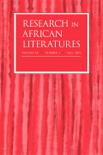
RESEARCH IN AFRICAN LITERATURES
Fostering Interdisciplinary Insights in African StudiesRESEARCH IN AFRICAN LITERATURES is a prestigious peer-reviewed journal published by Indiana University Press, dedicated to the critical exploration of African literary traditions, cultures, and texts. With an ISSN of 0034-5210 and an E-ISSN of 1527-2044, this journal stands out in the field of literature and literary theory, currently ranking in the 80th percentile of its category according to Scopus, making it a significant platform for scholars and researchers alike. Since its establishment, the journal has evolved through converged volumes from 2002 to 2024, consistently fostering innovative discourse and interdisciplinary approaches that illuminate the complexities of African narratives. Although it does not offer open access, the journal is integral for anyone engaged in African studies, providing critical insights that are essential for understanding the broader implications of literature within diverse cultural contexts. The journal's commitment to high standards of scholarship is reflected in its Q3 quartile ranking and its influential contribution to contemporary literary dialogue.